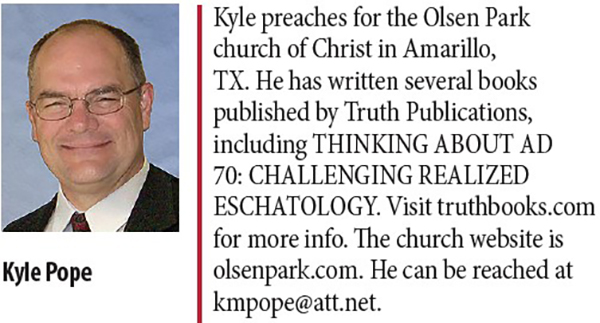
by Kyle Pope
Synopsis: The OT often used apocalyptic language to describe significant divine judgments. When the NT employs similar language, does it foreshadow an ultimate reality or exaggerate something that will never actually happen?
Apocalyptic language is defined as language “describing or prophesying the complete destruction of the world; resembling the end of the world; momentous or catastrophic; of or resembling the Biblical Apocalypse [i.e., the Book of Revelation]” (New Oxford American Dictionary). While such language may draw its name from apokalupsis, the Greek name of the Book of Revelation, apocalyptic language is used throughout the Bible. For example, the Holy Spirit led Joel to write, “I will show wonders in the heavens and in the earth: blood and fire and pillars of smoke. The sun shall be turned into darkness, and the moon into blood, before the coming of the great and awesome day of the LORD” (Joel 2:30-31, NKJV). After Christ’s ascension, when the Holy Spirit came upon the apostles on the day of Pentecost, Peter declared that these events fulfilled Joel’s prophecy. He told the people, “this is what was spoken by the prophet Joel” (Acts 2:16), going on to quote the text from Joel (Acts 2:17-21). While there is no indication that these things literally occurred on that day, Peter’s application of Joel’s words shows they carried a figurative and spiritual sense as they related to the significance of what happened on that day—the church began, the New Covenant was initiated, and the promised kingdom of the Messiah was established.
While all would agree that apocalyptic language can have a figurative and spiritual application, the question is if that means we should see all examples of this type of language as figurative and spiritual, but never literal? For advocates of the AD 70 Doctrine (Realized Eschatology or Full-Preterism) the answer is, “Yes!” Don K. Preston, a prolific spokesman for this movement, writes:
The language of the prophets by its very definition is veiled and obscure; it is marked by poetic imagery, license, and exaggeration, and is impressed with hyperbole, metaphors, and symbols. . . . The manner of fulfillment was essentially spiritual, not physical, and that language which on its face appears to describe the dissolution of the chemical elements in a cataclysmic end of time and space must be given a figurative construction and interpretation. This is required, not only because of the confines for fulfillment imposed by statements of time, but by the usus loquendi [manner of speech] of the prophets” (“What Is Preterism”).
A favorite appeal of the proponents of this doctrine is Acts 13:27, where Paul rebukes the Jewish leaders in their rejection of Jesus because, “they did not know Him, nor even the voices of the Prophets which are read every Sabbath.” To AD 70 proponents, understanding “the voices of the Prophets” doesn’t just mean making sound interpretation of the teachings of the Prophets. To them, “the voices of the Prophets” is almost a type of hidden code that allows those who have truly discerned it to realize that Jesus won’t really come again, the dead won’t literally be raised, the heavens and earth won’t really “pass away,” and all end-times apocalyptic language will never literally happen.
As any who have ever encountered this doctrine know, addressing the claims of this complicated and confusing teaching is a momentous endeavor, well beyond the scope of this short study. For a more thorough treatment of the overall topic, I refer the reader to my study, Thinking about AD 70: Challenging Realized Eschatology (Athens, AL: Truth Publications, Inc., 2019). For our purposes, let us explore one simple issue: if all apocalyptic language is “exaggeration” and “hyperbole” wouldn’t that compromise the truthfulness of God?
Full-preterists place great emphasis on the truthfulness of God when it comes to time statements. Samuel G. Dawson, for example, writes, “Our God doesn’t make time prophecies and then fail to fulfill them. His faithfulness is greater than that” (Essays on Eschatology, 28). William Bell echoes this, writing, “To maintain the integrity of the text and the inspiration and truthfulness of Christ, the event has either occurred, or Christ was untruthful. That’s the bottom line and simplicity of it all” (“What Is Realized Eschatology?”). Preston further writes, “Time elements cannot be disregarded or explained away consistent with the doctrine of verbal inspiration. The very authority of the Scriptures is at stake” (“What Is Preterism?”). Certainly, God means what He says, but these teachers apply rigid, subjective definitions to terms such as “near” and “at hand,” but then gloss over the actual words the Holy Spirit reveals in apocalyptic language. That treats time statements as literal and absolute, but apocalyptic language as “exaggeration.”
In speaking of God, Paul told Titus that He “cannot lie” (Titus 1:2). This principle of God’s nature is a theme that runs throughout all of Scripture. In 1 Samuel, we read: “The Strength of Israel will not lie nor relent. For He is not a man, that He should relent” (15:29). The Law of Moses declares, “God is not a man, that He should lie, nor a son of man, that He should repent. Has He said, and will He not do? Or has He spoken, and will He not make it good?” (Num. 23:19).
What bearing should this have on our understanding of apocalyptic language? No, on the day of Pentecost God did not actually cause “wonders in the heavens” or “blood and fire and pillars of smoke.” The sun was not actually “turned into darkness” and the “moon into blood,” so did God simply exaggerate? If so, how can we know that any of His promises are not simply exaggeration? If so, did God lie? Absolutely not! On the other hand, what if apocalyptic language has an immediate and a future application? In other words, while the apocalyptic cosmological events did not actually happen on Pentecost, did the significance of that event foreshadow an ultimate future reality? If so, God said it, and He will ultimately do it.
If we interpret all apocalyptic language as simply an usus loquendi (or manner of speech) of the prophets, consider where that must lead us. Did God mean what He said in affirming that the dead will come forth from graves (John 5:28-29)? Did God mean what He said when He stated “heaven and earth will pass away” (Matt. 24:35)? Did God mean what He said when He promised that Jesus will come on the clouds (1 Thess. 4:17)? Did God mean what He said when He promised that all nations shall be gathered together for judgment (Matt. 25:32)? Did God mean what He said when He promised a time when there will be no death, tears, or pain (Rev. 21:4)?
Advocates of the AD 70 Doctrine treat time statements literally, but all other end-times promises as figurative. That is presumptuous! How does that not impugn the honesty of God? The Holy Spirit asks, “Has He said, and will He not do? Or has He spoken, and will He not make it good?” (Num. 23:19). Yes, God always does what He says. Apocalyptic language is not a divine lie, or an “exaggeration.” Even when applied to temporal acts of judgment and significant events, it foreshadows an ultimate reality. God said it; one day He will do it! God has spoken it and He will make it good in the end! 
Bell, William. “What Is Realized Eschatology?” AllThingsFulfilled.com. October 26, 2008. https://www.allthingsfulfilled.com/what-is-realized-eschatology/.
Dawson, Samuel G. Essays on Eschatology, Amarillo, TX: SGD Press, 2009.
Preston, Don K. “What Is Preterism?” BibleProphecy.com. Preterist Research Institute. September 18, 2008. https://bibleprophecy.com/articles/2006/09/18/what-is-preterism/.


